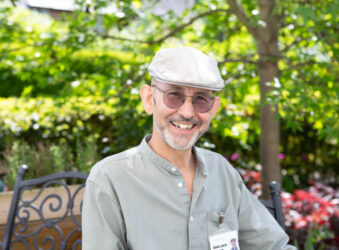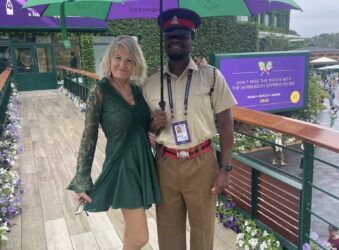End of Life Death Doula shares her role with Hospice patients
Share this story

You may have heard of a Birth Doula – someone who supports a Mother through her pregnancy, labour and first few days or weeks after giving birth.
Death Doula’s or ‘Soul Midwives’ are a similar service offered to people who are dying. They have been in the news recently, following the previous Green Party Leader, Caroline Lucas, working in Lewes with Living Well Dying Well.
Ute Towriss, is an end of life Death Doula and visited patients attending the Living Well Service sessions at Arthur Rank Hospice Charity to share more about her role.
What does a Death Doula do?
A Death Doula can offer a range of different support such as emotional, psychological and practical help. They can go to appointments with the client and be someone to take notes or to speak up for them.
They can be a listening ear and allow the client to get things off their chest without judgement or upset – sometimes it is easier to talk to a stranger than a family member.
They can walk the dog, chop vegetables, make a cup of tea or simply be there to hand over a tissue at a difficult moment.
Death Doulas support the person with a life limiting illness and they can also support the Family. ‘Family’ can mean a relation, friend, colleague or anyone who is close to the client.
Death Doulas can also offer the carers some respite by giving them an hour off to take a walk or time for themselves.
I help everyone at every stage to think about what is most important to them at the end of their life.
Why would someone have a Death Doula?
Before the NHS was in place from 1948, it was regular practice for people to die in their own homes. End of life care and knowledge was passed down through the family from Mothers and other family members but that doesn’t happen so much now.
Some people don’t have someone to support them and sometimes families are struggling with their loved one’s prognosis. Ill people can feel tired, grumpy or upset and this can be difficult at times for their Carers. Some people are afraid of death. I supported a 93 year old lady, she had never seen anyone die and had never seen a dead body. That can be scary for some people.
Another client came to me when he had decided to stop his cancer treatment. His partner wasn’t of the same mind and because of his decision this made her feel cross, angry and argumentative with him. I supported both of them. I didn’t need to say anything. Just by sharing the responsibility, through time their relationship changed. They didn’t know what was next so they came to Arthur Rank Hospice for a visit. They had a look around and spoke to a Dr. They said afterwards that they could see the next steps now and it wasn’t so frightening.
Where do the Death Doulas support?
Death Doulas can support the client at home, in a hospital or a hospice.
When would a Death Doula start?
A Death Doula can support a person and their family, from the moment they hear the news that they have a life limiting illness, but they can also step in at the last weeks, days or moments before they die.
They can be hired for the final days and hours and can prepare and support those around them. A Death Doula can work with a client to find out their wishes and ask how they want those last days or hours to be.
Why did you choose to be a Death Doula?
I like to support people to close their life. I think life is a bit like a tapestry; we have made some fine stitches in beautiful colours but there are knots. Our fingers get stuck on the knots. Doulas help to see the fine stitches.
It can be difficult to remember your identity across your life. I believe if we are listened to and our wishes are respected we can stay as ourself.
What do people choose for their death?
One man had his children singing songs around him. Another man wanted to die alone.
Maybe they want their hand held or for someone to put a taste of their favourite chocolate on their tongue, or their arms stroked and lips moistened. Some want silence – it can be different for everyone.
I ask my clients – “What do you want after the moment of death?” Buddhists want their body left as long as possible – others want to be washed.
What training or qualifications does a Death Doula have?
Death Doulas do not have to be trained clinically, although some do happen to be trained nurses. I used to be a Primary School Teacher. Recently I visited a school to teach a session to 13 year olds about life and death.
Where can I find a Death Doula?
I belong to an organisation called ‘End of life Doula UK’. End of Life Doula UK is a membership association and community of practice for end of life doulas, as well as a central point of contact for individuals seeking end of life doula support in the UK. They set the standards for UK end of life doula practice and provide information about end of life doulas to the public, healthcare professionals, and the media.
If you would like to visit Arthur Rank Hospice Charity for a tour please sign up for the next open day: arhc.org.uk/hospice-open-days or you can take a virtual tour: arhc.org.uk/hospice-tour
View other stories
-

Living Well Patients at the Hospice relax with Meditation
David Lynch from The Mindful Green Coach, visits the Living Well Service
-

Cambridge Hospice Volunteer supports with pre-loved fashion at Wimbledon Tennis Tournaments in London
Volunteer, Nadia Macari-Brown supports the Charity at one of the most famous sporting events in the world
-

Russell shares his Living Well experience
"There’s a very, very good and tight family atmosphere here"
-

Susan shares her Living Well Experience
"I wanted to come somewhere just to think about having hope, when living with a condition like this"




